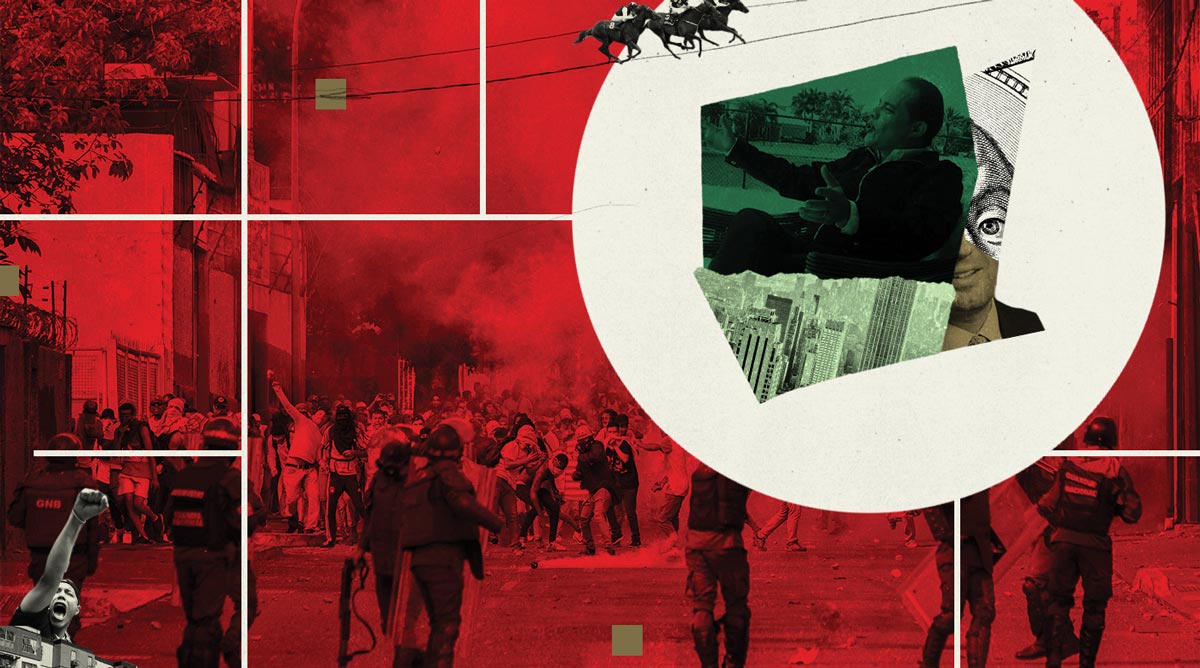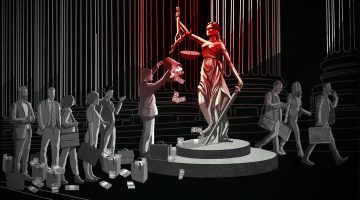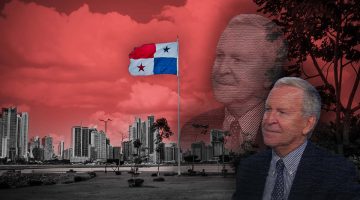A key consultant to United States law enforcement efforts to pursue corrupt Venezuelan government officials and drug traffickers is now himself being investigated in Spain for allegedly extorting some of the same wealthy Venezuelans targeted in U.S. probes.
Prosecutors in Spain allege that Martin Rodil, the consultant and a prominent expert on Venezuelan corruption, led a group that targeted wealthy Venezuelans suspected of corruption. Members of this group, including three Spanish police officers, are now under investigation for alleged influence-peddling, corruption and money laundering. In court documents, Spanish prosecutors say the former officials, who are prominent figures in Venezuela’s massive public corruption scandal, paid Rodil and his associates in the apparent belief that it would help them avoid criminal charges.
Rodil has not been charged. He did not respond to requests to comment for this story.
Allies of Rodil say that the former Venezuelan officials accusing him are attempting to discredit the U.S. investigations into their own alleged malfeasance by launching a campaign against a key aide to U.S. authorities. They say prosecutors in Spain — a country that some experts call a safe haven for corrupt Venezuelans — are misguidedly pursuing an agenda based on the misinformation campaign of these oligarchs.
Roger Noriega, a former U.S. Assistant Secretary of State in the George W. Bush administration, who more recently has worked with Rodil’s consulting business, called Rodil an effective anti-corruption crusader and said that the payments to him “were made in the context of when Martin was cooperating in carefully monitored activities” overseen by U.S. authorities. The Spanish investigation stems from “a story being spun by criminals with their legal counsel,” Noriega said.
With a wide-ranging consulting practice, Rodil has worked with the U.S. Drug Enforcement Administration as well as the nation’s top prosecutors’ offices.
Rodil has maintained two professional specialties that complement each other: He provides private consulting services to wealthy Venezuelans seeking to relocate to the United States, partially through connecting them with officials involved in his other line of business – helping the U.S. government to pursue corruption and drug cases. These Venezuelans could in essence trade their knowledge of crimes for residency in the US.
In extensive court records filed in the 29th investigative court of Madrid, Spanish prosecutors allege that Rodil tried to extort at least three former Venezuelan officials. In investigative reports and a proposed arrest warrant filed with the court in October, the prosecutors assert that Rodil’s key point of leverage was the perception that with his extensive connections to U.S. and Spanish law enforcement, he could help mitigate their legal troubles. The investigative documents filed in Spanish court that ICIJ reviewed include alleged examples of Rodil strongly urging Venezuelans to buy his consulting services, but provide little evidence that he made direct threats or deployed coercion. In Spanish criminal cases, prosecutors can make detailed allegations before any charges are filed.
The sums at issue in Spain’s investigation of Rodil pale in comparison to the billions of dollars that the former Venezuelan officials, including Nervis Villalobos, formerly one of Venezuela’s top energy officials, are alleged to have collectively swindled from Venezuelan public coffers. Some of the prominent defendants have been awaiting trial in Spain for years.
The case of Rodil highlights the difficulties of pursuing international corruption cases and the pitfalls of prosecutors conducting work with the motley collection of informants and consultants who are often key to making such cases work. These collaborators often come with complex dealings in risky businesses that can raise allegations of conflicts of interest.
The Department of Justice did not respond to a request to comment for this story.
Spanish prosecutors declined to comment.
- Recommended reading
A rainmaker in tackling Venezuelan corruption
In recent years, Rodil also gained prominence as a policy expert on Venezuelan corruption and has been quoted by the AP and NPR, as well as ICIJ, and has penned articles on Venezuela for the Daily Beast.
A lengthy 2016 profile by Bloomberg describes Rodil as a gregarious and commanding presence, someone who “mastered the art of being both bulldozer and sweetheart” in delivering critical breakthroughs to U.S. prosecutors.
In just a few years, Rodil rose from obscurity as a low-level researcher at the International Monetary Fund (IMF) to become an important figure in an international effort to fight Venezuelan corruption, according to Bloomberg. While at the IMF, Rodil was tasked with researching illicit payments relating to Venezuela’s state-run oil and natural gas company, Petróleos de Venezuela, S.A., or PDVSA, whose notorious corruption soon became an obsession, according to Bloomberg. Soon, he was working as a consultant with Noriega, who is a prominent voice for conservative policy positions toward Latin America and a fierce opponent of the leftist governments of presidents Hugo Chavez and, later, Nicolas Maduro.
By 2016, Rodil was working with an array of law enforcement offices and was considered a key asset to U.S. efforts against Venezuelan corruption. It was a time when U.S. prosecutors were zeroing in on a group of Venezuelan former officials who had allegedly looted billions of dollars from PDVSA. The U.S. imposed a raft of new sanctions on the country’s leaders and indicted the country’s then-president, Maduro, and his predecessor, Chavez.
U.S. officials have called PDVSA a primary organ of Venezuela’s state corruption, as the site of bribery schemes, currency manipulation, and embezzlement. The firm generates a major share of the country’s GDP and has served as the country’s largest employer. In 2002, Chavez appointed loyalists to top executive posts at the oil and gas firm, sparking street protests and a government crackdown that left 19 people dead. Later that year, Chavez fired 18,000 PDVSA employees who were on strike, cementing his control over the Venezuelan economy.
Various former officials and financial professionals were ultimately indicted in the U.S. for crimes relating to the oil company. Widespread public corruption in Venezuela is believed to have contributed substantially to the country’s deteriorating infrastructure, rampant inflation and high rates of hunger and starvation.
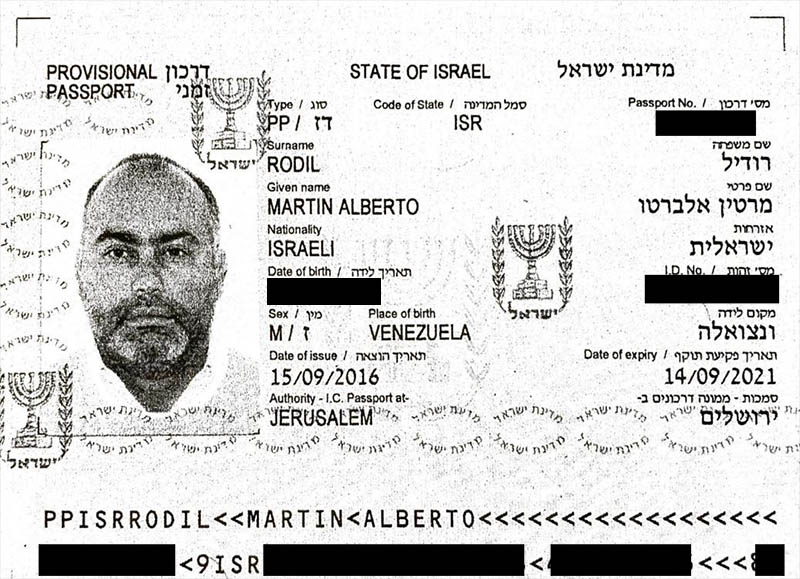
A copy of Martin Rodil’s Israeli passport.
Bloomberg labeled Rodil a “rainmaker” for U.S. authorities and, by several accounts, his value and closeness to law enforcement was extraordinary. He worked on Venezuelan cases with the DEA, and state and federal prosecutors in Miami and Manhattan. According to Bloomberg, Rodil also began assisting the Israeli government with its own investigations.
Bloomberg reported that Venezuela refused to renew Rodil’s passport, and ICIJ found that Rodil subsequently gained citizenship in Israel, where he has considerable business connections.
“Martin is probably one of the most effective people out there in terms of aggregating information and recruiting witnesses that have been used to indict corrupt Venezuelans,” Roger Noriega said.
Extortion allegations and work with U.S. authorities
Javier Alvarado Ochoa, a former PDVSA executive facing money laundering charges in the U.S. and now living in Spain, told ICIJ that Rodil talked of his extensive connections to U.S. prosecutors and DEA officials. “You have problems here,” Alvarado recalls Rodil telling him. “Prosecutors are waiting for you, they’re investigating you in the United States. Let me help you.”
Rodil “is a very good and subtle extortionist,” Alvarado told ICIJ. “He causes you sickness, so that you have the need to be cured.”
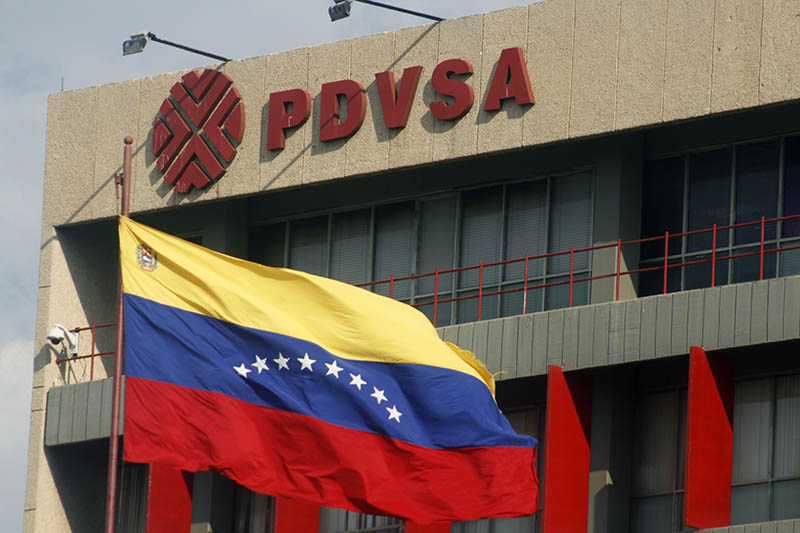
Venezuela’s state-run oil and natural gas company, Petróleos de Venezuela, S.A., or PDVSA. Image: Humberto Matheus/NurPhoto via Getty Images
Alvarado said Rodil demanded $2 million in exchange for helping him with his legal troubles. According to documents provided by Alvarado’s attorney to the Spanish prosecutor in September, Alvarado paid Rodil more than 1.1 million euros (more than $1.2 million) in three transactions between March and December 2015. Prosecutors in Houston in 2019 charged Alvarado with money laundering, alleging he laundered millions in corrupt proceeds from PDVSA as part of a vast bribery scheme. The U.S. has filed extradition requests for Alvarado that Spanish courts have rejected. Alvarado’s attorneys have claimed his prosecution is “fatally flawed” due to a statute of limitations passing, jurisdictional issues and what they call factual inaccuracies in the indictment.
Between 2016 and 2017, Rodil received more than 6 million euros (around $6.8 million) in payments from Villalobos, according to Spanish court records. In 2018, Villalobos was charged in the U.S. with money laundering involving foreign bribery. Attorneys for Villalobos have also denied the charges and have moved to dismiss the case.
According to the Spanish court records, Hugo Gois, a Portuguese national, sent millions of dollars he had received from Villalobos and others to shell companies registered in jurisdictions such as Cyprus and Scotland, including entities allegedly controlled by Rodil.
Gois was later indicted in Miami in 2018 for allegedly laundering money for Venezuelan officials. U.S. charges against him are pending. Spanish court records indicate that authorities in Spain used Gois’ extensive files to build their own case against Rodil.
Gois did not respond to a request for comment.
The Spanish court records detail the activities of one firm, Glenfield Corp. LP, a Scottish limited partnership, which is a type of incorporation that has become popular with money launderers and oligarchs in recent years. A corporate record shared with ICIJ by Expresso states that Rodil used an agent, who represented himself as the sole shareholder of Glenfield in corporate filings, effectively hiding Rodil’s ownership in the firm in public filings.
The agent’s name, Adrian Matthew Bradley, or sometimes just Matthew Bradley, appears in different variations in the records of dozens of shell companies around the world, according to leaked documents and public records. ICIJ sent requests for comment to Bradley’s apparent email address, but received no response. “Bradley Matthew Adrian” is a “decoy name” for a fugitive Ukrainian oligarch named Serhiy Kurchenko, according to an article on the website of the Atlantic Council, a Washington think tank. Ukrainian prosecutors have accused Kurchenko of amassing millions of dollars via tax evasion and stealing from bank investors.
Give now and double your impact. Your gift will be matched dollar-for-dollar, up to $100,000, thanks to generous donors.
Questions around the case
Noriega said he did not have enough information about the payments from Villalobos and others to provide a full explanation, but he said he is confident that the payments were made as a part of a U.S. operation.
The DEA did not respond to a request for comment. In an affidavit submitted to a Spanish judge in October, a former supervisory agent with the DEA named Robert Zachariasiewicz claims that, after ten years of work with Rodil, he “never observed or had reason to suspect improprieties or violations of law in Mr. Rodil’s” professional activities. Zachariasiewicz declined to comment for this story.
Debra LaPrevotte, a former FBI agent who had a focus on corruption cases, told ICIJ that the extortion allegations seem odd because Rodil did not work directly for the U.S. government and would therefore have little ability to influence the direction of cases. “This does not sound like extortion to me,” she said.
LaPrevotte added that payments to a government contractor can be part of a U.S. government operation.
“The government can participate in what appears to be illegal activity to see if a person will bite,” LaPrevotte said.
-
Leak to us
-
Contact reporter
Do you have a story about corruption, fraud, or abuse of power?
ICIJ accepts information about wrongdoing by corporate, government or public services around the world. We do our utmost to guarantee the confidentiality of our sources.
Noriega, Rodil’s friend and former colleague, said the indicted former Venezuelan officials are simply attempting to discredit the U.S. charges against them. “These guys are criminals,” Noriega said. “I’m still at the stage in life where I believe what the U.S. Department of Justice tells me over what an international crime figure on the lam in Spain says.”
Noriega said that the Spanish investigation’s assertions are further discredited by Spain’s lenient treatment of wealthy Venezuelans fleeing allegations of corruption. Although Spanish prosecutors have charged Villalobos, Alvarado and others for crimes related to PDVSA, the cases have dragged on for years while Spain has denied U.S. requests to extradite. The former officials, meanwhile, live there in luxury.
“Drug traffickers and corrupt actors have a long history of fleeing to Spain to avoid extradition to the U.S.,” said Paul Pelletier, a former federal prosecutor who worked extensively on corruption cases. “It’s a tried and true formula.”
In a 2019 article examining the long-running cases of Villalobos, Alvarado and others, the German researcher Jan-Michael Simon concluded that Spain’s delayed prosecutions “could create a risk that Spanish jurisdiction could be perceived as a safe haven for those involved in Venezuelan state organized crime.”
Three years later, nothing has changed with the cases of Alvarado and Villalobos, Simon told ICIJ, noting that there is an industry in Madrid of white-shoe lawyers and consultants who serve the interests of rich Venezuelan clients. Simon said similar dynamics have emerged in other jurisdictions, such as allegedly corrupt Brazilians living in Peru. “This is the perfect scheme of a safe haven for major figures in international corruption.”
Contributors: Marcos García Rey, Micael Pereira, Gerardo Reyes and Uri Blau. ICIJ worked with Armando.info, Expresso, La Sexta, Moncloa.com, Shomrim and Univision.

